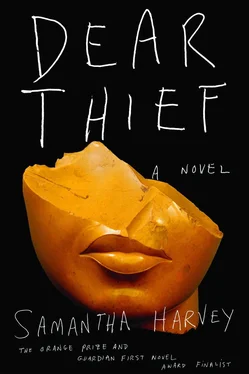But then, who would not quiver? The picadors come out on horses that have their eyes covered and their ears stuffed. They gather in on the bull and lance its shoulders and neck, and that is when it becomes tentative, demure, as if wooed into an unplanned engagement. It lowers its head. In one of the fights the picador is too enthusiastic and lances it to its knees so that by the time the matador enters the ring it is barely able to stand, let alone fight. The crowd jeers and throws cushions; they wanted to see a fair contest. You waft your polka-dot fan restlessly around Teddy’s sleeping head. But this is only one of the six fights, and in the others the bull is lanced into a kind of taut energy. The banderilleros run into the ring and towards the bull with their spikes. These sticks, like the feathered arrows in Teddy’s archery set, festoon its shoulders. It looks like a morris dancer, Nicolas says, with his chin drawn back in concern.
By the time the matador enters with his cape and sword, the bull is already swaying sideways and forwards as if at sea, with punctured and twitching muscles — surprised, I think, and offended, but here is the thing — seeing itself for the first time in true relation to something else, no longer alone and dominant, but suddenly half of a two-way exchange. You can see this in the way it makes and keeps eye contact with the matador and maintains both closeness and space. They circle one another; the matador swishes his cape, the bull scrapes at the ground. The blood on its flank thickens in the heat, everybody is hot inside the bullring.
Maybe the bull has a moment of love then. You might laugh, but if all you ever do is live unthreatened in the bubble of your absolute autonomy, eating, shitting, inseminating, replicating yourself over and over, what can you really love? Now it has the man at eye level and it understands the invitation. The cape communicates between them, beckoning, repelling, this way, that way, charge, hold back. The band plays. We shouldn’t think the bull is just meat thrown into a ring, it is an intelligence and it wants something it sees, it wants to be reckoned with. And the matador — we shouldn’t be fooled by his gold silk, he is an animal and he wants to be reckoned with. You see that for a moment — only a moment — the bull recognises himself in the man, and the man in the bull.
Why can’t this moment go on longer between them? As in the tango, which never resolves. When the bull finally realises that the man is cruel, there is no longer recognition. The bull is not cruel, why does the man have to be; why must it end like this? The matador draws his sword and pushes it down through the shoulders into the bull’s heart, or lungs, or whatever meets the sword first. The bull’s eyes become humid. In two fights the kill is clean, in the other four a second sword has to be used to cut through the spine. The result is the same: one way or another the bull staggers and drops like a rock into its short shadow, and is dragged away to music.
The heat is flattening and Teddy has slept through the whole thing, with his head on Nicolas’ lap. Your thumbs twitch in rage but you have become otherwise still and quiet. Nicolas has been watching you out of the corner of his eye. I have been wondering why a sword had to be drawn; slaughter is so unintelligent, so colourless, it forces us to think the least interesting thoughts. It makes us think that the strong one wins and the weak one loses. It makes us think the winner does not limp.
You look pleased with yourself. Have you been out stealing hens?
You have that blush you get when winning at cards, which in this case might be to do with remembering Spain; you mentioned that holiday for a long time after — the villa we stayed in with the big, cool, marble-floored living room and virtually nothing in it, save for five cheap armchairs and a vast table that converted into a platform for table tennis when the net was clipped on.
You liked the villa, didn’t you — the villa and its garden. Cool and uneventful inside, hot and busy out, with its wild grasses rubbing drily together and its geckos darting and cicadas creaking in the juniper tree and its — as you put it — slatternly flowers. You enjoyed our daily struggle of sun versus parasol as we tried to construct movable shade on the beach. We made a circle of shade and it became an ellipse and then a sliver. We made another and another the entire day long and the sun hovered and swooped in on each one. I think this thankless task appealed to you, probably even amused you — when Nicolas, Teddy and I went in the sea, you stayed onshore to crawl about spearing the two parasols into the sand, draping towels or T-shirts across the gap. Then you would sit in the sun and let yourself burn. In the dried-up riverbeds of the Tabernas Desert you found a sprawling oleander and what you thought was an edible prickly pear, which you tried to pick, before our guide bent and stopped your hand. Squinting up at the gallows in the main street at Fort Bravo film studios, you held your blouse away from your body, red-faced, hair wet with sweat, and grinned at a crack of gunshot as though you were the happiest you had been.
Yes, I’d say Spain has flushed you. On the screen your geese are sheeting, gliding out of frame. Sliding, gliding, slipping through a narrow gap in existence towards freedom and something more real than all this table-hut-bed-forest-city-man-woman debacle we call reality. But suddenly, because I brought it up, you are thinking of Spain, and every time you think of Spain it brings to mind that bit in the Aitareya Upanishad, that bit about the bull. What is it? God pulls a bull out of the water, then a horse, then a man. There is God, going about creation messily, engaged in the hot, dark, slick, wet process by which life is dredged from the depths. You like this bit — God the diver and delver, slumping his finds onto the bank and giving them life with his breath.
You left before the end of the bullfight and sat outside the plaza in the street, chain-smoking some little pencil-thin cigarillos. By the time we found you there was a handful of spent ends piled up by your toes. ‘How could you watch it?’ you said. ‘It was like watching Henry VIII slaying his wives. You two would have been the kind of people who went to public hangings.’
We thought then that you would be unbearable for the rest of the evening; Nicolas looked glad it was the last day. Forgive us for thinking that everything you had enjoyed about Spain had been undone in one afternoon in a bullring — we were wrong. You said something that evening as we were walking back through Almería in the dusk that I have maybe only recently interpreted fully. Teddy commented that there was no grass, or no green bumps, as he called it — hills, pasture, meadow. He was right, it was just coastal plain, mountain or desert canyon. And when, at the thought of English greenness, Nicolas began humming ‘Jerusalem’, you said something like, ‘The Jesus who walked upon England’s mountains green was a fop, that is the truth, a fop who got lynched.’
I remember it, because it was only half an hour or so after leaving the plaza, and if ever the green pleasantness of England was going to come into your favour it should have been then, in your recoil from the bullfight. But instead you opened up from your tall stoop and walked so as to maximise the evening air on your chest, and back at the villa you cut yourself a fringe with kitchen scissors so that your face was an open window and Spain could come flooding in, like fresh air into a sickroom. It was the emboldening a person gets when they see another behave more despicably than themselves; it was a final sealing of a friendship that you and Spain had been developing all week.
Читать дальше












